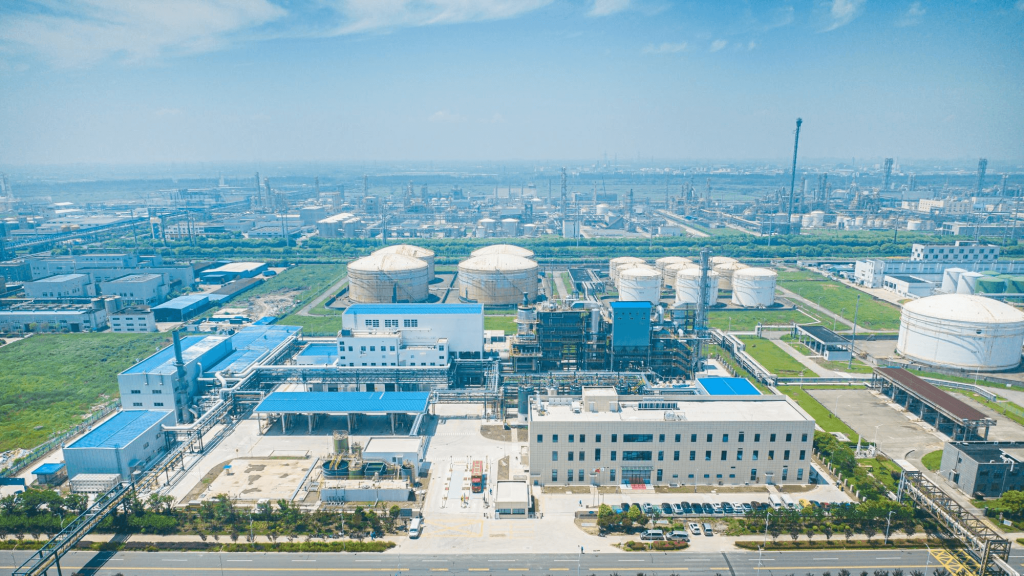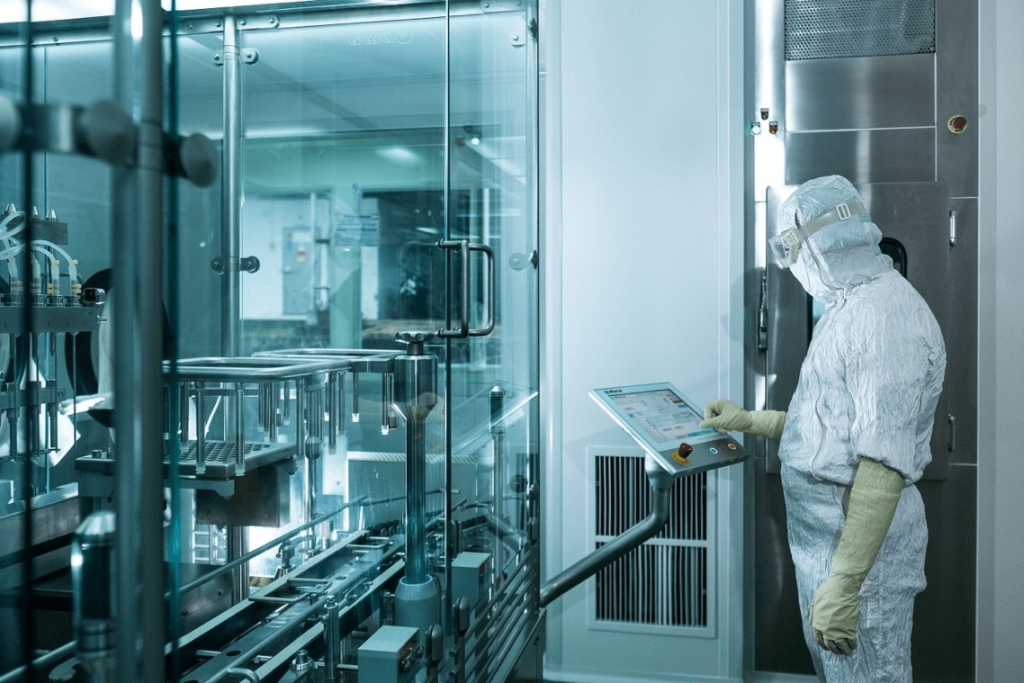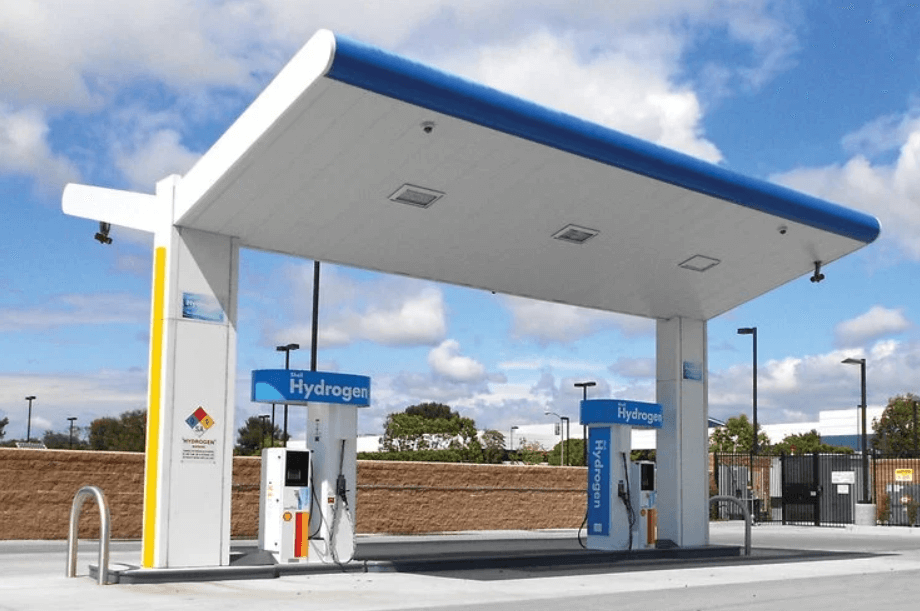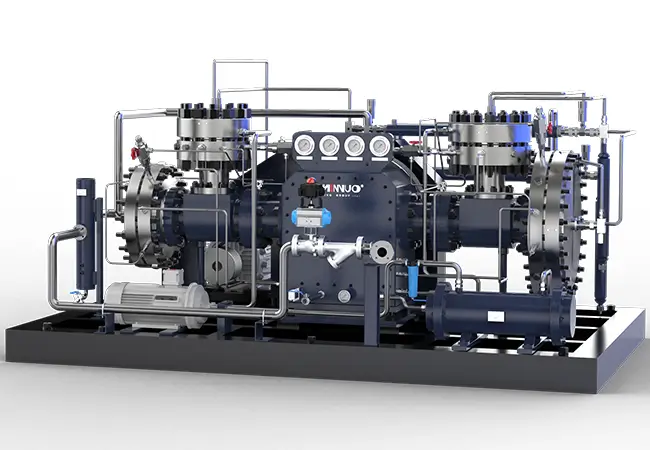In the field of industrial gas compression, choosing between reciprocating piston compressors and diaphragm compressors is never an “either-or” decision—it’s about precise matching to your operating conditions. As a manufacturer with 20 years of experience in compressors, Minnuo not only focuses on technological iteration but also verifies through thousands of on-site cases that selecting the right model can increase production efficiency by over 30%. Here, we break down the core differences and selection logic between the two based on practical application scenarios.
I. Core Differences: Operating Principles Define Application Boundaries
1. Reciprocating Piston Compressors
Compress gas through the reciprocating motion of pistons. With mature structures, they excel in scenarios requiring “high flow rate and low cost.”
✅ Advantages: Single-unit flow rate up to 1000 m³/h+, maximum pressure ratio of 30:1, low initial procurement cost—ideal for large-scale continuous production.
❗ Note: Compatibility between the medium and lubricating oil must be considered; conventional models require an oil-gas separation system.
2. Diaphragm Compressors
Achieve “zero-contamination compression” by isolating the compression chamber from drive components using elastic diaphragms (metal/non-metal).
✅ Advantages: Gas purity ≥ 99.999% (absolute oil-free); excellent sealing performance, suitable for flammable, explosive, toxic, or corrosive media (e.g., hydrogen, chlorine, pharmaceutical gases).
❗ Note: Single-unit flow rate is mostly ≤ 100 m³/h, with higher initial investment—better suited for medium-to-low flow rate scenarios requiring high purity.
II. Minnuo’s Practical Cases: Different Scenarios, Different Choices
Case 1: High-Flow Feed Gas Compression in Chemical Parks – Reciprocating Piston Compressors Are More Efficient
Customer Need: A leading European chemical company required ammonia compression for nitrogen fertilizer production, with a flow rate of 800 m³/h, discharge pressure of 1.6 MPa, using conventional industrial gas, and sensitivity to cost.

Minnuo Solution: Recommended the reciprocating piston compressor Model P-800 series, featuring wear-resistant alloy piston rings and a two-stage compression design to match ammonia characteristics.
Results:
• 365 days of trouble-free continuous operation; maintenance interval extended to 8000 hours (industry average: 6000 hours);
• Energy consumption reduced by 12% compared to similar models, with annual electricity cost savings of over 120,000 Euros.
Case 2: Sterile Gas Delivery in Pharmaceuticals – Diaphragm Compressors Are a Must
Customer Need: A U.S. biopharmaceutical company required compression of sterile nitrogen gas (purity 99.999%) for vaccine production, demanding zero oil contamination, zero particle residue, flow rate of 30 m³/h, and pressure of 0.8 MPa.

Minnuo Solution: Customized diaphragm compressor Model M-30 series, equipped with food-grade PTFE diaphragms and stainless steel chambers, certified by the FDA.
Results:
• Gas purity stably maintained at 99.9995%, meeting GMP sterile standards;
• Diaphragm service life reached 10,000 hours (industry average: 7000 hours), reducing downtime for maintenance by 40%.
Case 3: High-Pressure Boosting at Hydrogen Refueling Stations – Diaphragm Compressors Are More Reliable
Customer Need: An Asian hydrogen refueling station required hydrogen compression from 2 MPa to 70 MPa for fuel cell vehicle (FCV) refueling, demanding absolute sealing (hydrogen embrittlement resistance) and pressure fluctuation ≤ ±1%.

Minnuo Solution: Selected diaphragm compressor Model H-70 series, with metal diaphragms made of Hastelloy alloy, equipped with hydrogen sensors and an explosion-proof system, compliant with ISO 17268 standards.
Results:
• Daily hydrogen refueling capacity of 500 kg; pressure fluctuation controlled within ±0.5%, compatible with all mainstream FCV models;
• 18 months of leak-free continuous operation, certified with EU CE and ATEX explosion-proof certifications.
III. Minnuo’s Selection Guide: 3 Steps to Lock in the Optimal Solution
1.Evaluate Medium Characteristics:
Conventional gases (air, nitrogen, natural gas) + high flow rate → Reciprocating piston (Model P series);
Special media (hydrogen, chlorine, pharmaceutical gases) + high purity → Diaphragm (Model M/H series).

2.Calculate Economic Viability:
For long-term high-flow operation → Reciprocating piston compressors have lower initial costs and more favorable total cost of ownership (TCO);
For medium-to-low flow rate + high purity requirements → Diaphragm compressors have higher initial investment but avoid production losses caused by contamination (e.g., scrapped pharmaceutical batches).
3.Verify Compliance:
The EU market requires CE certification; North America requires UL certification; the pharmaceutical/food industries require FDA/GMP certifications—all Minnuo compressor models have obtained major global certifications.
IV. Why Choose Minnuo?
From chemical parks to pharmaceutical workshops, from hydrogen refueling stations to electronics factories, Minnuo’s core advantages lie in:
• Customization Capability: Tailored designs based on medium (corrosive/flammable-explosive), pressure (0.1-300 MPa), and flow rate requirements;
• Global Service Support: After-sales centers in Germany, the U.S., and Singapore, with 48-hour response time for maintenance requests;
• Intelligent Upgrades: Full IoT remote monitoring support for proactive fault early warning, reducing unplanned downtime.
• Take Action Now: Share your medium type, flow rate, and pressure requirements with us, and Minnuo engineers will provide a free selection report + case references within 24 hours!
Minnuo – Making every compression precisely match your production needs.





 Email
Email sales:+86 15366749631
sales:+86 15366749631

